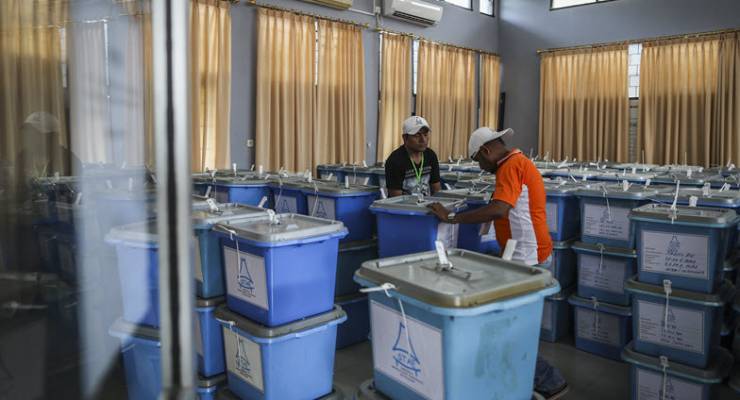
With 83% of the votes counted in East Timor’s elections, it appears that five of 21 parties have gained enough votes to be represented in the next parliament, with Fretilin and CNRT strengthening their dominance of the country’s political landscape.
Early indications of the allocation of seats based on the party list vote showed Fretilin is likely to take 23 seats in the 65-seat unicameral legislature. CNRT looks as though it will take 22 seats. This is consistent with expectations and is notable in demonstrating a closing gap between the two parties’ popularity.
Former president Taur Matan Ruak’s new People’s Liberation Party is expected to take eight seats. The Democratic Party (PD) is expected to take seven, which marks a decline of one seat from its 2012 results. This decline is likely due to the death of PD’s popular leader Fernando “Lasama” de Araujo in 2015.
The surprise outcome of the elections was the rise of Khunto, which looks to have taken five seats. Khunto is seen as a “militant” party and appears to have benefited from the rise in the number of younger voters that have come onto the electoral roll. For the first time, East Timorese born since the 1999 independence ballot were able to vote.
The other 16 parties did not meet the 4% threshold for gaining a seat in Parliament, with many of them only achieving around 1% of the vote.
Assuming this allocation of seats is fairly final, the real question now is which alliance of parties will form government. The general expectation is that Fretilin and CNRT will continue their alliance, in which they have shared government since 2015. Alternatively, one or the other of them could seek to form a coalition with the three smaller parties. Based on past experience, Fretilin would have most difficulty in forming such an alliance.
Former president and prime minister Xanana Gusmao has said that he favors a “government of national unity” for the stability it brings East Timor. His CNRT party supported Fretilin’s Rui Araujo as the last prime minister and endorsed Fretilin’s Francisco “Lu-Olo” Guterres’ successful candidature in March’s presidential election.
[Is East Timor run by a ‘stable’ govt or conspiratorial oligarchy?]
There is now a sense that Gusmao will be seeking a return of those favours in asking Fretilin to support a CNRT member becoming East Timor’s next prime minister in a new alliance between the two parties. There is little doubt that many CNRT members are keen to see a redress of what many perceive as recently overly favorable treatment of Fretilin.
The elections were otherwise peaceful and well run, with reports of problems being minor in character and number and not affecting the validity of the process. East Timor ran the 2017 elections entirely by itself, and has demonstrated that it is maturing as a political society. This appears to be matched by its peoples’ continuing commitment to participating in the democratic process.
The real question for the next government, after it chooses a new prime minister, will be how this tiny, oil-dependent country addresses budgetary spending well in excess of sustainable income. Resolving the long-running dispute with Australia over drawing a permanent equidistant boundary between the two countries in the Timor Sea is widely viewed as central to that.
Those negotiations are continuing, if slowly. But it would not be in Australia’s own interests to drag out those negotiations any further than absolutely necessary.
To do so, and the potential economic consequences that such a move would likely imply, would be to jeopardise one of the developing world’s democratic success stories. It is in Australia’s interest to help sustain — or at least not act against — East Timor’s democratic success.
*Damien Kingsbury is Deakin University’s professor of international politics and co-ordinator of the Australia Timor-Leste Election Observer Mission








If only ASIO, under Alexander Downer’s guidance, hadn’t completely wrecked Australia’s credibility.
Should have read ASIS. That was under his control as Foreign Minister, not ASIO.